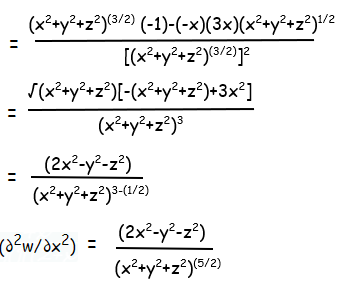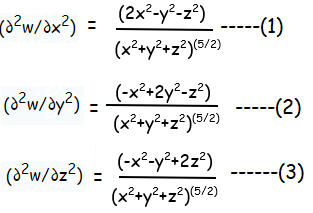FIND THE SECOND PARTIAL DERIVATIVES OF THE FUNCTION
Subscribe to our ▶️ YouTube channel 🔴 for the latest videos, updates, and tips.
When we find partial derivative of F with respect to x, we treat the y variable as a constant and find derivative with respect to x .
That is, except for the variable with respect to which we find partial derivative, all other variables are treated as constants. That is why we call them as “partial derivative”.
If F has a partial derivative with respect to x at every point of A , then we say that (∂F/∂x) (x, y) exists on A.
Note that in this case (∂F/∂x) (x, y) is again a real-valued function defined on A .
Problem 1 :
Let
w(x, y, z) = 1/√(x2+y2+z2), (x, y, z) ≠ (0, 0, 0).
Show that (∂2w/∂x2) + (∂2w/∂y2) + (∂2w/∂z2)
Solution :
Given :
w(x, y, z) = 1/√(x2+y2+z2)
∂w/dx = -1/2(x2+y2+z2)(3/2)(2x)
∂w/dx = -x/(x2+y2+z2)(3/2)
u = -x and v = (x2+y2+z2)(3/2)
u' = -1 and v' = (3/2)(x2+y2+z2)1/2 (2x)
v' = 3x(x2+y2+z2)1/2


(1) + (2) + (3)
= (2x2-y2-z2-x2+2y2-z2-x2-y2+2z2)/(x2+y2+z2)5/2
= 0
Problem 2 :
If V(x, y) = ex(x cos y - y sin y), then prove that
∂2w/∂x2 = ∂2w/∂y2
Solution :
Differentiating with respect to x.
∂w/∂x = ex(cos y - 0) + (x cos y - y sin y)ex
∂w/∂x = ex [cos y + x cos y - y sin y]
Differentiate with respect to x.
∂2w/∂x2 = ex [0 + x (-sin y) + cos y (1) - 0]
∂2w/∂x2 = ex [-x sin y + cos y] ----(1)
Differentiating with respect to y.
∂w/∂y = ex(-xsiny - [y(cosy) + sin y (1)] )
∂w/∂y = ex [-xsiny - ycosy + sin y]
Differentiate with respect to x.
∂w/∂y = ex [-xsiny - ycosy + sin y]
∂2w/∂y2 = ex [-xcosy -y(sin y) + cosy(1)+ + cos y
0 + x (-sin y) + cos y (1) - 0]
∂2w/∂x2 = ex [-x sin y + cos y] ----(2)
(1) = (2)
Problem 3 :
If w(x, y) = xy + sin(xy) , then prove that
∂2w/∂y∂x = ∂2w/∂x∂y
Solution :
Differentiating with respect to y.
∂w/∂y = x(1) + cos(xy)(x)
∂w/∂y = x + xcos(xy)
∂w/∂y = x[1 + cos(xy)]
Differentiating with respect to x.
∂2w/∂y∂x = x[0-sin(xy)(y)]+[1 + cos(xy)](1)
∂2w/∂y∂x = -xysin(xy) + 1 + cos(xy)
∂2w/∂y∂x = 1 + cos(xy) -xysin(xy) ----(1)
Differentiating with respect to x.
Given : w(x, y) = xy + sin(xy)
∂w/∂x = y + cos(xy)(y)
∂w/∂x = y + ycos(xy)
∂w/∂x = y[1+cos(xy)]
Differentiating with respect to y.
∂2w/∂x∂y = y[0-sin(xy)(x)]+[1 + cos(xy)](1)
∂2w/∂x∂y = -xysin(xy) + 1 + cos(xy) ----(2)
(1) = (2)
∂2w/∂x∂y = 1 + cos(xy) -xysin(xy)
Problem 4 :
If V(x, y, z) = x3+y3+z3+3xyz, show that
∂2v/∂y∂z = ∂2v/∂z∂y
Solution :
Given : V(x, y, z) = x3+y3+z3+3xyz
∂v/∂y = 0+3y2+0+3xz
∂v/∂y = 3y2+3xz
∂2v/∂y∂z = 0+3x(1)
∂2v/∂y∂z = 3x ------(1)
Given : V(x, y, z) = x3+y3+z3+3xyz
∂v/∂z = 0+0+3z2+0+3xy
∂v/∂z = 3z2+3xy
∂2v/∂z∂y = 0+3x(1)
∂2v/∂y∂z = 3x -----(2)
(1) = (2)
Problem 5 :
A firm produces two types of calculators each week, x number of type A and y number of type B . The weekly revenue and cost functions (in rupees) are
R(x, y) = 80x + 90y + 0.04xy − 0.05x2 − 0.05y2 and
C(x, y) = 8x + 6y + 2000 respectively.
(i) Find the profit function P(x, y) ,
(ii) Find ∂P/∂x (1200, 1800) and ∂P/∂y (1200, 1800) and interpret these results.
Solution :
To find profit function, we will subtract cost function from revenue function.
P(x, y) = R(x, y) - C(x, y)
= (80x + 90y + 0.04xy − 0.05x2 − 0.05y2)-(8x + 6y + 2000)
P(x, y) = (72x + 84y + 0.04xy − 0.05x2 − 0.05y2- 2000)
∂P/∂x = 72+0.04y−0.1x
∂P/∂x at (1200, 1800) = 72+0.04(1800)−0.1(1200)
= 72+72-120
= 24
The profit increases.
∂P/∂y = 84+0.04x-0.1y
∂P/∂x at (1200, 1800) = 84+0.04(1200)-0.1(1800)
= 84+48-180
= 132-144
= -48
The profit decreases.

Apart from the stuff given above, if you need any other stuff in math, please use our google custom search here.
Subscribe to our ▶️ YouTube channel 🔴 for the latest videos, updates, and tips.
Kindly mail your feedback to v4formath@gmail.com
We always appreciate your feedback.
About Us | Contact Us | Privacy Policy
©All rights reserved. onlinemath4all.com

Recent Articles
-
Problem Solving Strategies for SAT Math
Feb 17, 26 08:09 PM
Problem Solving Strategies for SAT Math -
SAT Math Challenge Problems
Feb 17, 26 07:01 PM
SAT Math Challenge Problems -
How to Solve Challenging Math Problems in SAT
Feb 17, 26 06:42 PM
How to Solve Challenging Math Problems in SAT

